 It’s gotten very little attention, but according to the Associated Press the NBA and the player’s union have already begun collective bargaining talks in advance of the current collective bargaining agreement (the CBA) which expires after the 2010-11 season.
It’s gotten very little attention, but according to the Associated Press the NBA and the player’s union have already begun collective bargaining talks in advance of the current collective bargaining agreement (the CBA) which expires after the 2010-11 season.
The AP piece notes that the main point of contention (as it always seems to be) is how revenue will be split between the owners and players. But I have much broader concerns than the eventually agreed upon revenue split, such as guaranteed contracts, trades, the luxury tax line and age limits.
How this all pans out will affect owners, players and fans alike so it's not too early to discuss it, worry about it and let the voice of the fan be heard. Because if the talks stall or reach an impasse resulting in another lockout, it's the fans and the employees who depend on the NBA who ultimately get screwed. Not the multi-billionaire owners or the multi-millionaire players.
One way or the other, the next CBA will look different from its current version which anyone associated with the NBA would admit has its flaws. Before targeting what's wrong and needs to be fixed with the CBA, let's point what's good about it. (By the way, if you'd like to become an expert on the particulars of the current CBA and are up for a lot of legal reading this weekend, you can read the entire agreement here.)
From a macro perspective, even though this flies in the face of all my capitalistic principles I'm glad the NBA has limits on how much players can get paid and how much teams can spend with some flexibility. While it may not be great for TV ratings, it's great for the league as a whole that teams like the Nuggets and Spurs can – in theory -compete with the likes of the Lakers and Knicks who dwarf the smaller markets in revenue and market size. Like the NFL, in the NBA you're only as good as your owner and general manager. So if you're based in San Antonio and have a great owner and a great GM (in the Spurs case they have a great owner and two great GMs) you can out-duel a team based in New York who might have an awful owner and an awful GM (which the Knicks have had historically…the jury is out on what Donnie Walsh is up to).
Some may argue that the NBA's "soft cap" – whereby you can exceed the salary cap to re-sign your own players – only favors big markets, but I'd argue that it favors owners who are willing to spend, not necessarily big markets (see Clippers, Los Angeles and Sterling, Donald). I also appreciate the NBA's rookie scale. Year after year we witness the NFL's absurd process of getting rookies into training camp in time as their agents wait for the first pick to sign before setting the market for everyone else drafted. Simply put, Knowshon Moreno doesn't hold out if he's drafted by the Nuggets instead of the Broncos.
That's the good. Now for the bad.
First off, the guaranteed contract in its present form must go. How many more Tim Thomas's or Darius Miles's or Erick Dampiers do we need to see to recognize that the guaranteed contract must be scrapped? The word on the street is that the owners will aggressively fight the union on it in this next go-around of negotiations. And they absolutely should. The Nuggets current situation with Kenyon Martin being owed $15.4 million and $16.5 million over the next two seasons is a textbook example of the guaranteed contract becoming an albatross for an entire organization. The Nuggets have an owner willing to lose money to bring Denver an NBA championship, a competent management team in place and a deep, talented roster that's just a solid big man away from possibly winning that championship. And yet because of K-Mart's deal, the Nuggets will be lucky to score a Jeff Foster-caliber center.
Like they do in the NFL, I'd like the NBA to move to a system where contracts are partially guaranteed and much of that guaranteed money is paid up front, giving players the incentive to play their hearts out and keep in shape when those non-guaranteed years kick in. For whatever reason, too many NBA contracts are backloaded for when players get older and less hungry. And at the very least, if the union insists on guaranteed contracts teams should have the right to cut one player per year, pay the player out but not have it count against the cap. I don't have an issue with encouraging owners and GMs to stay away from dumb contracts (like the one Joe Dumars gave Ben Gordon this summer), but I don't think owners – like the Nuggets Stan Kroenke or the Mavericks Mark Cuban – should be penalized for being willing to spend to reward their fans. The K-Mart trade-and-sign was a disastrous decision in hindsight, but it came from a good place: Kroenke wanted to reward Nuggets fans for supporting the team by adding an impact power forward. Why are we making owners suffer for that?
Secondly, trades need to be simplified. In order to make an NBA trade today, teams must swap salaries that are within 125% of each other plus $100,000. Throw in trade exceptions and non-simultaneous trades and completing an NBA trade can rival doing your taxes: it's an overly complicated system that no one really understands. I have no issue with salaries having to matchup to a point, but the difference needs to be higher than 125% plus $100,000 to give GMs more flexibility to make deals. Too many solid veterans are shipped around (see Smith, Joe) as contract fodder only to be cut and re-signed by the teams that dealt them in the first place. Why not allow trades to be within 200% and ditch the trade exception stuff altogether?
Thirdly, the luxury tax line needs to be raised. As a Nuggets fan I'm admittedly biased here, but it's not fair for Stan Kroenke to be asked to lose triple what the Lakers lose to put a similar product on the floor. If a small market owner like Kroenke is willing to shell out as many salary dollars as a big market owner like Jerry Buss or Cuban, why is he getting penalized so much for it? As reported a few months back, Kroenke allegedly loses about $10 million a season before the Nuggets exceed the luxury tax line. As of today, Kroenke is on the hook to pay out $76 million in player salaries – or $6 million over the $70 million tax line which means another $6 million goes into the NBA's coffers. So between the $10 million Kroenke allegedly loses plus the $12 million he'll be paying out in salary/to the NBA, this could be a $22 million loss. Conversely, the Lakers don't lose any pre-luxury tax line money and while I'm sure they'll say differently, I doubt between their ticket sales (double Denver's), TV and radio package (triple or quadruple Denver's) and sponsorship deals (also probably triple Denver's) they lose any money all – even when they exceed the tax line. Whatever percentage of basketball related income (BRI) the NBA is using to set the tax line needs to be adjusted.
Fourthly, the minimum age rule should mirror MLB's. The one-and-done rule by which kids have to play at least one year of college basketball or enter the NBA after the age of 19 has backfired on the NCAA. It should really be called one-semester-and-done because that's exactly what's happening. What's the point of having great coaches like Roy Williams or John Calipari or Ben Howland kill themselves to recruit and coach top prospects only to have those prospects jet off to the NBA after a semester on campus? Like baseball, I'd like to see the NBA scrap the age limit. If you're ready to come into the NBA – a la LeBron James, Kobe Bryant, Kevin Garnett, Dwight Howard, and so on – then they should be allowed in right away. And for those who stay in college, they should stay at least three years or wait until they're 21, as they do in Major League Baseball.
The catch to this last point is that while MLB has a great farm system, the NBA needs an actual farm system. We were getting there until some NBDL teams went broke during the recession. Because ideally, each NBA team would have its own NBDL team stocked with coaches and prospects of their choice. I've always wondered if Nikoloz Tskitishvili would have been as big a bust as he turned out to be had he played 40 minutes a night for the 14ers for a full year before competing in the NBA. Imagine an NBA where solid veterans get to keep a bench spot for an extra season or two while rookies and raw prospects play 40 minutes a night on an NBDL team or in college. The quality of basketball in the NBA would rival what we saw in the late 1980's.
As the NBA did when they negotiated the last CBA, let's hope the owners and players union get way ahead of it and we never even get close to a lockout. But as fans, we too must be vocal and let our voice be heard. Because as Nuggets fans are experiencing first hand, the system as-is cheats us out of celebrating our first NBA Championship.
(Photo courtesy of Chris Carlson, AP)


